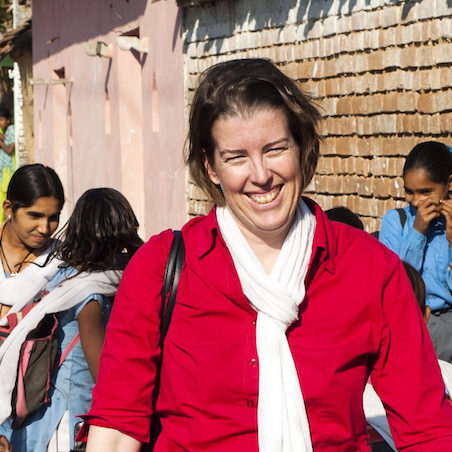Stephanie Nolen
Global Health Reporter, The New York Times
Bachelor of Journalism (Hons.), 1993; Doctor of Canon Law, 2009
I did every possible thing wrong.
This is the same Stephanie Nolen who has won seven National Newspaper Awards, five Amnesty International Media Awards, and numerous other accolades. Her book, 28: Stories of AIDS in Africa, was nominated for the Governor General’s Literary Award. Her latest book is Promised the Moon: The Untold Story of the First Women in the Space Race.
Let’s rewind. Stephanie Nolen graduated from King’s in 1993 into “the teeth of a bitter recession.” There were no jobs. One year later, she was armed with an MSc in development economics from the London School of Economics, but there were still no jobs. So she decided to move to the West Bank to work as a freelancer.
“I did every possible thing wrong,” she says. “I went to a place where there was a huge domestic press corps and no need for a freelancer who didn’t speak the language, and didn’t really know what she was doing.”
Because she had no money, Stephanie lived in a Palestinian village, travelled by bus, and shopped at a local market. She learned Arabic. And when Israel invaded Lebanon, she found herself in the right place at the right time, able to ask questions in the right language. She soon found herself working on stories for Newsweek and The Independent newspaper.
Since then, Stephanie has reported from more than 80 countries. As a Globe and Mail foreign correspondent, she helped bring the AIDS crisis in Africa to international attention and told the stories of ‘untouchable’ girls in rural India. Wherever she goes, she tries to learn the language and diligently strives to tell the stories of those who “have no voice.”
Stephanie served as Latin American Bureau Chief for The Globe and Mail based in Rio de Janeiro from 2013 to 2019. In 2018, she was awarded an Ochberg Fellowship at the Dart Center for Journalism and Trauma at Columbia University’s Graduate School of Journalism. It gave her an opportunity to learn even more about trauma and “improve coverage of violence, conflict and tragedy”, the daunting truths of the kind of reporting she has done so well.
But feeling daunted has never stopped Stephanie. “To the degree that I have a personal motto – it’s on a magnet on my fridge – it’s a line from Amelia Earhart, who said ‘Courage is the price that life demands for granting peace.’ Remembering that has got me through on occasion. Going into Iraq was scary and, in a different way, so was trying to understand and tell the stories of untouchable girls in India.”
Studying journalism at King’s provided Stephanie with a core set of skills. What she also learned at King’s – the “larger issues of critical thinking and analysis” – were equally important to her career, she maintains. “King’s is a place where your brain is fed and your hunger for knowledge is fed and you are supported and feel secure to ask questions and to try things in a way that is precious and rare… You develop the confidence to be a challenging and critical voice. That was a gift.”
Image: Candace Feit, courtesy of the Globe and Mail.
Posted: Nov. 2017
 Connect with Stephanie Nolen
Connect with Stephanie Nolen